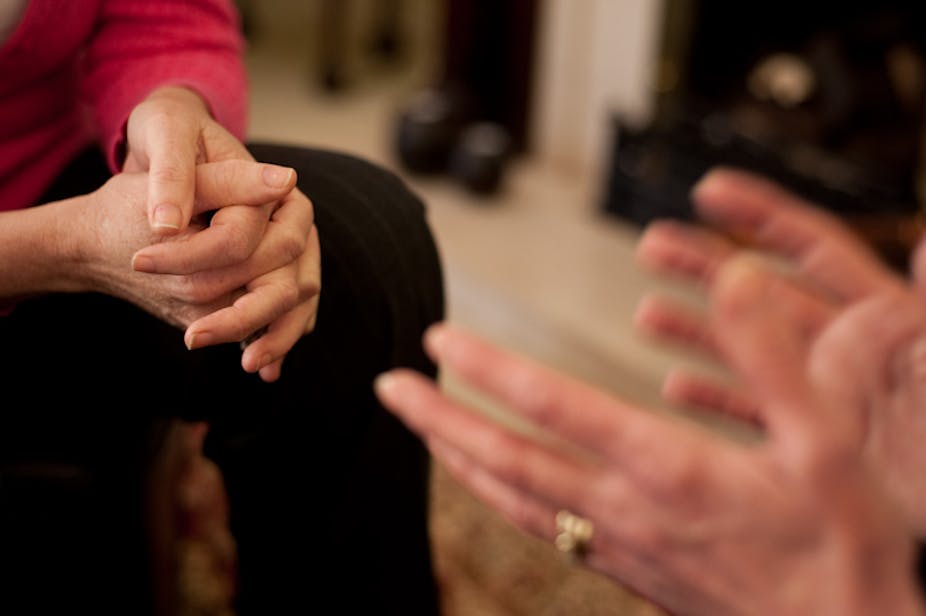Apart from sensitizing us to terrorism and altering how we travel on planes, 9/11 had a marked impact on how psychologists and psychiatrists respond to disasters. The change has been for the better.
In the wake of the 9/11 attacks, an expected influx of counsellors converged on New York City to provide the support everyone expected the city would need.
Up to 9,000 counsellors rushed to the city to assist survivors, with the expectation this would avert subsequent psychological disorders.
Even the Church of Scientology sent 800 counsellors to provide urgent aid.
But relatively few New Yorkers indicated they needed help, leading some to suggest the city was in denial and the full brunt of the psychological impact would become clear in the months that followed.
Over $US200 million was sought to manage the expected epidemic of mental health problems but as of March 2003, only 650,000 people had sought help through the program established to assist survivors and $90 million remained unspent.
Close scrutiny of the resources allocated to meeting the expected mental health fallout of the attacks followed. These inquiries highlighted several points that have increasingly influenced how disasters are now managed.
Lessons from the disaster
First, the majority of people affected by the attacks on both New York and Washington DC, were much more resilient than expected. Once they dealt with the expected transient distress of what occurred, people generally adapted.
One study found that whereas 8% of those living in Manhattan experienced post-traumatic stress disorder (PTSD) between five and eight weeks after the attacks, this rate dropped to 2% four months later.
This pattern has been observed repeatedly across many disasters – the initial distress people experience usually abates with time in the majority.
An important lesson from this observation is that there’s no need to rush and provide interventions for everyone after a disaster on the premise that they’re vulnerable and will develop problems unless they receive formal mental health intervention.
This has been the mistaken assumption for decades and has resulted in the unnecessary and unfortunate practice of trauma counsellors converging on disaster scenes in droves.
The second major lesson learnt during this last decade is that immediate psychological counselling (or debriefing, as it commonly known) doesn’t actually prevent subsequent problems.
Although often motivated by the hope it will avert serious psychological conditions, such as PTSD or depression in the months that follow, longitudinal studies of people who have and haven’t received psychological debriefing indicate that it doesn’t limit problems.
Instead, there’s tentative evidence that for people who are extremely distressed after trauma, debriefing may actually worsen their recovery.
And there’s convergent biological evidence underscoring the conclusion that disclosing emotional experiences immediately after trauma may, in some people, exacerbate stress hormones that can compound processes leading to conditions such as PTSD.
Adapting to changed understanding
These developments have resulted in a marked shift in how we now respond to disasters: no longer are we presuming that everyone is vulnerable and needs immediate intervention.
Nor are we mistakenly thinking that encouraging people to share their traumatic experience in the days after the impact is necessarily helpful.
Instead, there’s an international shift towards providing practical support in the aftermath of trauma that encourages people to use their own social supports; meets practical needs; provides information that may be helpful; and, if necessary, directs people to specialist services.
But this is not the final solution. Studies show a significant minority of people will experience a range of problems in the aftermath of disaster and they can benefit from structured assistance.
Not long after the 9/11 attacks, the United States was confronted with the challenges of Hurricane Katrina.
Many thousands of people required help but there were insufficient established mental health services to meet the need. So a program was established in collaboration between the US and Australia to develop protocols to address the major post-disaster problems that people face.
This program was intentionally based on strategies subject to empirical study and have been shown to effectively address key problems faced by disaster survivors.
Importantly, it was distilled to how to train providers who don’t necessarily possess mental health skills because in the wake of massive disasters, there’s frequently a need to utilise workers who traditionally don’t function as mental health professionals.
In recent years, many people have been trained across the United States in this way to prepare them for future disaster responses.
The framework was also successfully adapted after the Black Saturday fires in Victoria in 2009, when federal and state governments cooperated to implement a response that:
a) provided generic psychological first aid in the first instance,
b) trained many health workers across Victoria to provide psychological interventions that were adapted after Hurricane Katrina, and
c) ensured those who eventually developed full-blown psychological disorders were given evidence-based interventions by properly qualified clinicians.
The vastly improved mental health response to Black Saturday can be understood as a result of many lessons learnt since the 9/11 attacks.
Rather than presuming that all people are vulnerable, the emphasis now is on ensuring people’s natural resilience is supported, and that the minority of people who do require assistance receive programs with sound empirical support.
There are still stalwarts of older schools of thought who persist in rushing in as the floods subside or the aftershocks ease, attempting to “prevent” psychological harm they believe will inevitably develop.
Thankfully, policy makers and organisations are being swayed by the overwhelming evidence that these practices are unnecessary and potentially harmful. So trauma survivors are now benefiting from more intelligent and humane assistance.

